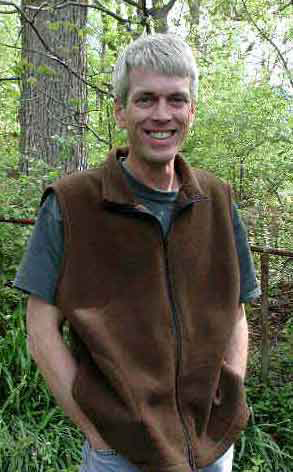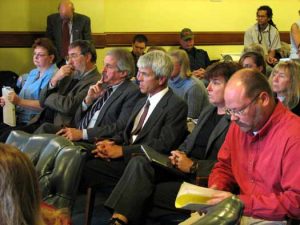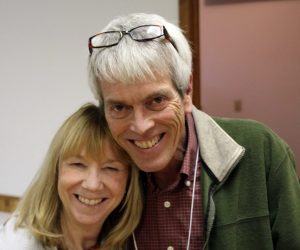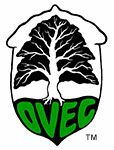- Like
- Digg
- Del
- Tumblr
- VKontakte
- Buffer
- Love This
- Odnoklassniki
- Meneame
- Blogger
- Amazon
- Yahoo Mail
- Gmail
- AOL
- Newsvine
- HackerNews
- Evernote
- MySpace
- Mail.ru
- Viadeo
- Line
- Comments
- Yummly
- SMS
- Viber
- Telegram
- Subscribe
- Skype
- Facebook Messenger
- Kakao
- LiveJournal
- Yammer
- Edgar
- Fintel
- Mix
- Instapaper
- Copy Link

Ben Stout. Photo by Janet Keating.
Update: Here’s the full obituary; note that the family is honoring Ben’s wishes for no funeral service; a celebration of life will be held at a later date.
Dr. Benjamin Stout passed away on August 3, 2018 at the age of 60 in Wheeling, West Virginia.
The preliminary obituary for Ben Stout reads:
Benjamin was born on December 21, 1957 and passed away on Friday, August 3, 2018. Benjamin was a resident of Wheeling, West Virginia at the time of passing. Ben graduated from Morgantown High School (1975), West Virginia University (BS in Agriculture and Forestry, 1980), and Tennessee Tech University (MS in Biology, 1982). He would later return to those communities to testify in Federal Court on behalf of citizens arguing that valley fills stemming from mountaintop removal mining operations were a violation of the Clean Water Act.
Ben was the scientist who traveled with Chief U.S. District Judge Charles H. Haden II to examine life in headwater streams near Blair, in Pigeon Roost Hollow, which a coal company had plans to fill in as part of its mountaintop removal coal mining operation. In the dead of winter, Ben showed Judge Haden leaf shredders and other aquatic insects and explained the important role that they play in stream ecosystems.
After Judge Haden traveled with Ben and also went on a flyover of mountaintop removal sites, he issued his famous ruling to halt valley fills. He essentially said that there was no stream quality because there were no streams, they were smothered under the debris of the former mountaintops. This was in 1999. At the time, then Governor Underwood, a former executive of Island Creek Coal declared “the sky was falling.” This was the beginning of many years of legal battles fighting to end mountaintop removal and to save our streams from certain annihilation. Despite that ruling, and many more that followed, to this day, the legal challenges to this insane form of coal mining continue, as does citizen outcry for an end to mountaintop removal! Because Ben was a professor, we believe some of his students will carry on his work. Maybe one of them will provide the scientific expertise that finally helps end mountaintop removal.

The water problems in some Mingo County communities were quite apparent. Photo by Vivian Stockman.
Ben was unmatched in his deep belief in and practice of community-based collaborative research. With assistance from residents of Mingo county, he sought to discover what was creating so many health problems. When he first met with them, he learned that their greatest concern was what might be lurking in their water. Ben worked with them for many years and truly cared about their well-being. He provided citizens with the kind of factual information that they needed to organize and advocate at the state legislature to achieve their goals of a public water system.
Ben and his work leave an indelible impact on the lives, hearts and minds of countless people and organizations, but especially the people of southern West Virginia. As a result of Ben’s collaborative work with the “Sludge Safety” team of OVEC, Coal River Mountain Watch, and citizens of Mingo and Boone Counties, tangible successes occurred, and rightly so; Ben’s legacy will endure. Successes he helped them achieve include the following: studies of coal sludge impacts on water and human health, a moratorium on new coal sludge injection permits, municipal water for four Mingo County communities (Rawl, Merrimac, Lick Creek, and Sprigg), and greater citizen power and involvement in the legislative process. These successes, that Ben so eagerly supported, provided encouragement to people living in the Boone County community of Prenter, who also pressed for and won a municipal waterline for much of their community.

Ben Stout, center, at a WV Senate hearing on coal slurry injection. Photo by VS.
When it came to speaking up for clean water and the people of West Virginia whose water had been polluted by extractive industries, Ben was all in. He not only focused his research on the problems, but he also met with people to discuss the results of their mutual efforts. He was welcomed into homes to sample tap water, water in hot water tanks, well water and adjacent streams. He was outspoken and blunt about his findings in public hearings and documentaries, though he never sought the limelight. Ben was a rare scientist who went beyond conducting and publishing research, he was a passionate scientist who used his expertise to benefit citizens and communities. He strongly believed that the scientific process of community participatory research saved and improved lives.
To that end, in 2012 he asked me to co-present with him at a scientific meeting in Louisville, KY. (Read Ben and Janet’s paper here.) The way he asked me was so Ben. In an email from him: “The reason I’m writing is to ask you if you would like to co-present with me. There is a special session on scientists working with non-profits. I’ve cut-and-pasted the details below. These are 12 minute oral presentations followed by 3 minutes of Q&A. I figure between your good looks and my big mouth we could pull it off. Seriously, we could put together a PowerPoint 12-slide thing pretty easy.”
How could I resist?
One trait I especially admired was that Ben had no problems expressing his personal views and feelings about important issues like mountaintop removal coal mining. Ben worried that there soon would be no potable water in areas where coal is mined, and he often reminded people that water is more valuable than coal. When he spoke, it came not only from his head, but also his big, yet humble heart.
In a segment of Burning the Future, a documentary about mountaintop removal by filmmaker, David Novack, Ben ponders the future and asks a very important question: “There is a better way to mine coal. It’s the traditional way of mining. It’s the one that requires a lot of miners, not a lot of explosives. Taking the top off of a mountain. Is that the right thing to do? I don’t think an individual can say yes to that. I think any individual knows that that’s wrong. How is it that we all get together as a community, as a group and talk each other into it that it becomes OK? Let’s face it, the planet is going to be here and there are going to be species here. Now the question is, are we going to be

Ben and Janet at a meeting about fracking. Photo by Allen Johnson.
a part of that?”
While, Ben’s work and students at Wheeling Jesuit were paramount in his life, he would also talk about his love for his three boys and close friends. And of course, he loved to fish. I went fishing with him once. Well, actually, he was fly-fishing while I watched birds. And that day, to mine and his delight, a bald eagle perched on a tree near the stream.
I feel so honored and grateful to have ever known Ben, a true hero of mine in West Virginia. What a remarkable man who served others and loved life as he did! His life has been a gift to me, and to so many people and organizations. His death is a profound loss affecting so many of us.
Rest in peace, dear man. You have earned it, through your love, life commitment and dedication to so many important environmental causes. You will be sadly and deeply missed.
—–
To explore some of the many stories on our website that report on Ben’s work, see Ben Stout site:ohvec.org
To take a really deep dive into the history of citizen activism and lawsuits to end mountaintop removal, see these Charleston Gazette-Mail archives, and explore mountaintop removal site:ohvec.org.








